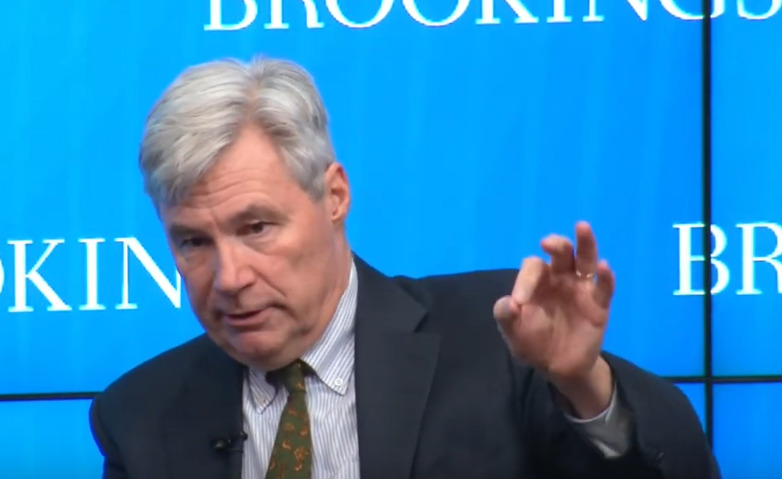Meeting climate goals through tax reform
Tuesday, February 27, 2024, 1:00 PM – 2:30 PM ET
The Brookings Institute hosted a “fireside chat” with Senator Sheldon Whitehouse, interviewed by a Wall Street Journal reporter. It seems that the Senate is preparing for a “massive” tax overhaul bill in 2025, because many of the tax breaks from prior years expire soon. Sen. Whitehouse is a strong proponent of “carbon pricing,” and is hoping to have carbon pricing in the bill.
After about 30 minutes of “fireside chat,” there was a roundtable discussion with:
- Kimberly Clausing, Eric M. Zolt Chair in Tax Law and Policy, University of California, Los Angeles School of Law
- Shuting Pomerleau, Deputy Director of Climate, Niskanen Center
- James Stock, Harold Hitchings Burbank Professor of Political Economy; Vice Provost for Climate and Sustainability, Harvard University
- Moderator: Sanjay Patnaik, Director, Center on Regulation and Markets, Bernard L. Schwartz Chair in Economic Policy Development, Senior Fellow, Economic Studies, Brookings Institution
What follows is the video, transcript and a summary:
Video
Transcript:
Whitehouse, Feb. 2024, Meeting climate goals through tax reform
Summary:
[Courtesy of Google’s Gemini AI:] Senator Whitehouse’s main points about carbon pricing and carbon tax policy are as follows:
Carbon Pricing is Necessary to Address Climate Change:
-
- Senator Whitehouse believes that a carbon pricing policy, such as a carbon tax, is essential to address climate change. He argues that the current system, where fossil fuels are not priced for the pollution they cause, is economically inefficient and environmentally harmful.
Carbon Pricing Makes Economic Sense:
-
- Senator Whitehouse argues that a carbon pricing policy would make economic sense. He points out that the International Monetary Fund estimates that fossil fuels receive $660 billion in annual subsidies worldwide by not being priced for their emissions. He argues that a carbon tax would help to level the playing field and encourage investment in clean energy technologies.
Carbon Pricing Will Have Political Support:
-
- Senator Whitehouse believes that a carbon pricing policy will eventually have political support, even though it may not be popular currently. He points to the example of the Affordable Care Act, which was initially unpopular but has become more widely accepted over time. He also notes that there are already a number of Republican senators who are working on a carbon border tariff measure.
Key Considerations for Carbon Pricing Policy Design:
-
- Senator Whitehouse acknowledges that there are a number of details that need to be worked out in designing a carbon pricing policy, such as the starting price of carbon, how the revenue from a carbon tax would be used,** and how to address concerns about carbon leakage (when businesses move their operations to countries with less stringent environmental regulations). However, he believes that these challenges can be overcome.
Overall, Senator Whitehouse is a strong advocate for carbon pricing as a key policy tool to address climate change. He believes that it is necessary, economically sensible, and will eventually gain political support.
** See, especially his remarks on the video from 11:15 – 12:55, especially 12:10 – 12:55, where he says:
If that’s achieved, then I’ve told my caucus, look, I want to get the bill passed, and by the bill, [I mean] a price on carbon. But how everybody wants to spend the money, I don’t feel I have dominion over that. We have deficit issues, we have significant investment and kind of like dead loss issues for equipment that was useful in a fossil fuel economy but is now basically a write off. There are plenty of good uses for the revenue and I don’t pretend to be the architect of all of that.

